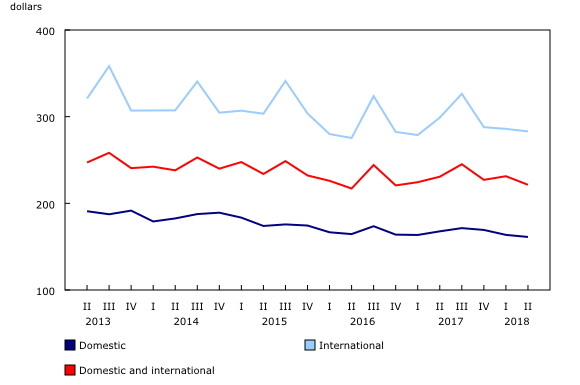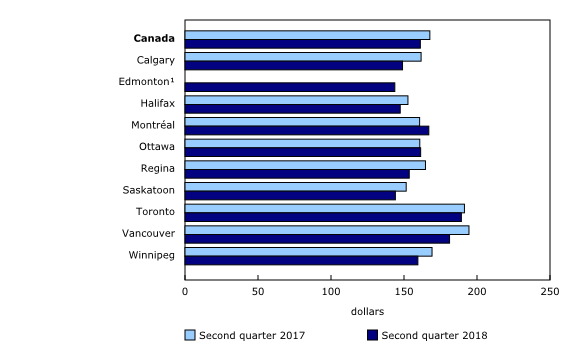Air fares, second quarter 2018
Archived Content
Information identified as archived is provided for reference, research or recordkeeping purposes. It is not subject to the Government of Canada Web Standards and has not been altered or updated since it was archived. Please "contact us" to request a format other than those available.
Released: 2018-12-12
$221.40
Second quarter 2018
-4.0% 
(year-over-year change)
Base air fares in Canada, domestic and international combined, averaged $221.40 in the second quarter, down 4.0% from the same quarter of 2017 and reversing the upward trend of the previous four quarters. This was the lowest level since the fourth quarter of 2016, when base air fares averaged $220.70.
Base fares do not include the goods and services tax, air transportation taxes or user fees, such as airport improvement fees or fuel surcharges. Average air fares are calculated for each flight stage—that is, when the passenger boards the aircraft at one airport and departs the aircraft at another airport.
The average domestic fare was down 3.9% year over year to $161.20 in the second quarter, while the average international fare fell 5.3% to $283.00. The decline in the international sector marked the first decrease since the first quarter of 2017.
Among the 10 selected cities where passengers boarded the plane (enplanement), all western cities recorded decreases in average domestic air fares, while two eastern cities—Montréal (+3.9%) and Ottawa (+0.4%)—posted increases.
Toronto ($189.30) remained the city with the highest average domestic air fare, followed by Vancouver ($181.20), Montréal ($167.00) and Ottawa ($161.40). These four cities recorded average domestic fares above the national average. Meanwhile, Edmonton ($143.70) posted the lowest average domestic air fare, edging out Saskatoon ($144.10), which had reported the lowest fare the previous quarter.
Note to readers
Average air fares are base fares and do not include the goods and services tax, air transportation taxes or user fees, such as airport improvement fees or fuel surcharges. All fares in this release are base fares.
Average air fares are calculated for each flight stage. When the passenger boards the aircraft at one airport and departs the aircraft at another airport, this is considered a flight stage.
The Fare Basis Survey covers Air Canada (including Air Canada rouge, Jazz, Air Canada's Canadian regional code-share partners), Air Transat and WestJet.
The data in this quarterly release are not seasonally adjusted.
Data for the first quarter of 2018 have been revised.
The Fare Basis Survey is being redesigned.
Contact information
For more information, contact us (toll-free 1-800-263-1136; 514-283-8300; STATCAN.infostats-infostats.STATCAN@canada.ca) or Media Relations (613-951-4636; STATCAN.mediahotline-ligneinfomedias.STATCAN@canada.ca).
For more information on the current definitions, data sources and methods of the Fare Basis Survey, click on the Related information tab of this release. Readers who wish to know more, or to consult with Statistics Canada about the redesign of this survey, can contact (statcan.transportationstats-statistiquesdutransport.statcan@canada.ca).
- Date modified:



